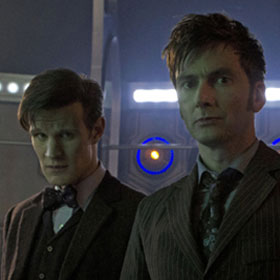'Doctor Who' 50th Anniversary Review: A Fun Episode Exposes What Happens When Matt Smith And David Tennant Collide

4.5/5
In 1963, William Hartnell made his appearance as the First Doctor, an alien with two hearts from the planet of Gallifrey. Even with director Waris Hussein and producer Verity Lambert (the youngest and only female producer working for the BBC at the time) at the helm, it's hard to believe that Doctor Who made it 50 years – truly a remarkable feat worth celebrating.
What all the anniversary specials on the BBC and elsewhere seem to gloss over is that the show was on hiatus from 1989 to 2005 (with a couple of unsuccessful revival attempts in-between), when Christopher Eccleston won the hearts of all as the sassy and frightfully bitter Ninth Doctor. It's as if no one wants to reflect on the egregious act of neglecting a delightfully cerebral and complex character bursting with potential for that many years. The Doctor is now an icon and a cultural staple, treasured internationally and respected across the universe.
If the 50th anniversary episode fell short, it would be an utterly tragic event in the BBC's timeline. With all the hype (a minisode, trailers, production stills, interviews with famous and well-respected Whovians such as Neil Gaiman, an entire week of marathons and specials on the BBC), I almost expected it to be a flop, but I was not disappointed in show runner Steven Moffat's interpretation of the anniversary. It really was tremendous: the perfect balance of whimsy, silliness, and surprising poignancy that audiences have come to love about Doctor Who.
"The Day of the Doctor" opens with a seemingly typical – or at least as close to typical as they get – Doctor Who mystery (there’s an odd incident at a museum in which a figure from a painting has vanished) and spirals into an adventure that is somewhat confusing, but still coherent, and most importantly, fun without losing gravitas. There are, of course, the necessary references to Doctors and episodes of yore, none of which are forced or out of place. (My personal favorite being the cameo by Tom Baker, the Fourth Doctor, as a curator in the gallery with the paintings of Gallifrey.) This is an impressive feat given the extensive canon of material to choose from. It would have been easy to pack the episode with nostalgia, but interestingly enough the episode focuses around altering the past- in such a way that it ensures that the Doctor’s drive to rescue humanity and approach all life forms with peace and respect remains, but he can still find inner peace. The episode, as it's written, is a wonderful way to construct the next Doctor's narrative- the installation if the War Doctor (John Hurt) tilts the current chronology of Doctor Who on its head and ensures that the next season, staring Peter Capalldi as the twelfth incarnation of the Doctor, will be very unique. What was also evident was the careful way in which the episode only messed with the timeline of the modern Doctor Who– the beloved classic Who remains relatively unscathed.
The only major flaw in the episode is writer Steven Moffat's careless sexism. For those not familiar, Moffat is somewhat notorious for his incompetence in writing strong female characters; rather, he tends to use women as quick-fix plot devices. This is a jarring transition from the work of his Doctor Who predecessor Russell T. Davies, whose companion characters always had something the Doctor lacked, or at least needed more of: compassion (Rose Tyler); a true protector (Martha Jones); a friend (Donna Noble). The way Moffat writes women leaves an astute viewer feeling like the characters are capable of so much more, but are relegated to mere accessories rather than accomplices.
A rather galling example in this episode is the portrayal of Queen Elizabeth I, an undisputed factual badass, as a damsel-in-distress type desperately besotted with the Doctor- to the point where they get married, with her considerable insistence (it’s quite troubling that her clingy pursuit of their betrothal is about as fierce as she gets). The Doctor agrees, rashly, and then goes through with it with substantial hesitance, considering it results in a time traveling alien being the king of England. It's a major plot point with potential to totally alter the canon of the show (and infuriate fans such as myself who are absolutely adamant that the only women for the Doctor are Rose Tyler, played by Billie Piper, and Alex Kingston’s River Song), but is not elaborated on at all with anything resembling character development or dynamic. Instead, Elizabeth is a way for the Doctor to realize when an alien shows up.
Incidents like this are the embodiment of what fans hate about Moffat: his willingness to punch plot holes that can only be resolved with self-congratulatory references to one-liners dropped in older episodes. The Doctor insists that some events are fixed in time, not to be changed. Perhaps the development of Moffat's ego is one more to add to the list.
Even so, it was great fun to see the dynamic between the three Doctors (Matt Smith, David Tennant and Hurt), how they change, and simultaneously enjoy and irritate each other- and seeing multiple incarnations of the Doctor onscreen really is a momentous occasion.
It was refreshing to find that Moffat’s typical flaws did not eclipse the quality of the episode, which left me with a zillion questions (in typical Doctor Who fashion) and a satisfying insight into the Doctor’s lesser-known characteristics, delivered superbly by an incredible cast of old favorites and new faces. Here's to 50 more, Doctor Who. Allons-y!
RELATED ARTICLES
Get the most-revealing celebrity conversations with the uInterview podcast!





Leave a comment